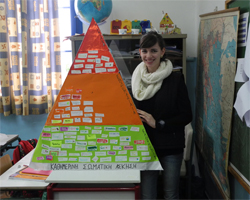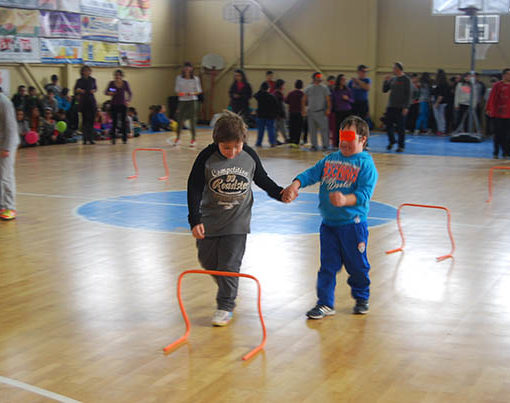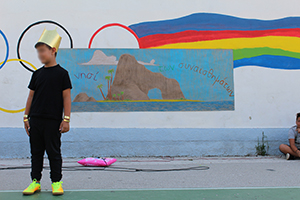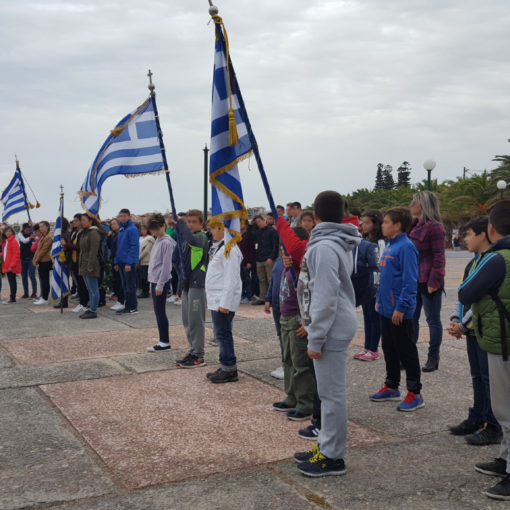October 28th, 1940. The day on which the Greek said “όχι!” The day on which the resistance of the Greek soldiers started and the national pride strengthened.
This day went down in history as the day that the Greek Prime Minister Metaxas refused the ultimatum given by Mussolini, who wanted free passage over the Greek-Albanian border for strategic reasons. Greece should surrender to Italy, otherwise Italy would impose war on Greece. Metaxas response was: “Όχι!” (greek: “no”)
It didn’t need an explanation to why, just a simple “no” was enough.
This answer resulted in the since then celebrated “Επέτειος του Όχι”, the Anniversary of the No. It’s a day filled with proud celebrations and solemn commemoration. Each year, on October 28th, military and student parades take place across the country and traditional dances are being danced to honor and celebrate the heroic actions of the Greek during World War II.
This year, I was lucky enough to experience Όχι-Day myself.
By living on this island and being part of the local community as a volunteer, you experience the celebrations differently than someone who is just here for a visit would. Everything feels more familiar. While waiting for the parade to start, my headmistress, the Mayor of Vrontados, waved at me when she saw me standing there. When the children representing my school walked past us with my gym teacher and some of my first graders followed in their clubs, it felt like I was part of them because I knew how excited and nervous they were for this day. And then finally, when the parade was over and we watched the children dancing the traditional dances and children from my school said “hi” to me and waved, it really felt like I belonged there and wasn’t just an outsider.
But let’s start from the beginning.

The days leading up to Όχι-Day were full of rehearsals, making crafts, buying outfits, singing songs and of course, a big mix of emotions. In the beginning, I didn’t see much of these preparations because I was busy with the first grade, who is too young to rehearse and present anything themselves. Instead, we watched lots of educational videos on what exactly is celebrated on this day and went to the rehearsals of the other grades together. A few days before Όχι-Day, I was then asked by other teachers to help them with some preparations for the big day. I cut out some papers for the performance of the grade fours and helped to carry everything out of the library so that we could set up the chairs for the performance. Two days before the big day, I took my class to the library to watch the final rehearsal, an hour later, I was able to watch it when it was performed in front of the parents and the following day, I watched it again together with the whole school as part of the big celebration. Even though, I saw it so many times, I still couldn’t get enough of it and was excited to watch it over and over again. Just the feeling of seeing the whole school being filled with pride and happiness and all the children running around, waving a small Greek flag in their hands put a smile on my face. But even after the play finished, the celebration wasn’t over yet. The oldest grade in my school, together with two of our teachers, went to the statue of Afanis Nautis (the Missing Sailor). This statue stands on the opposite side of the town hall at the ocean-side and is dedicated to all the sailors that perished at sea. There, each primary school and high-school was represented by a few of their own students. They stood side by side, facing the monument and the ocean, holding up a big Greek flag and a wreath. Each group of representatives brought the wreath up to the statue one by one and laid it at the feet of the sailor. This celebration ended with singing the Greek national anthem and it was amazing to see each group of students wearing the same uniform and standing proudly with the flag in front of the ocean.
After coming home that day, I was already impressed by the celebrations that took place but little did I know that the day after would be even more impressive.


The parade in Vrontados started at 11am. I wasn’t exactly sure of what to expect but was definitely very excited to see and experience this special day. We walked to the Missing Sailor again and arrived there just in time. Greek flags were hung up in the streets and Greek music blasting out of the speaker. You could already feel the happiness and the excitement of the locals and the best part of it all, we were right in the middle of it. By standing right across the town hall, we had the perfect spot to watch the parade. The marching band stopped in front of us to accompany the groups walking in the parade with music. Each school and club got announced by the Mayor of Vrontados and walked past us to get to the Statue of the Missing Sailor. Two of my grades were proudly representing our school and I was happy to see how calmly some of my grade ones walked in the parade since they were so nervous the days before and scared of messing something up. When the parade was over, we followed the crowd to the statue. Different clubs took turns dancing: There were two children clubs, one with kindergarten children and the other one with primary children and a folk dance club, dressed in the traditional clothing. A few children of my grade one danced in the club and it made me happy when they recognized me and smiled or waved. They practiced these dances by themselves during the school breaks the days before and I was already impressed by how good they were at it but seeing them perform it with the whole group made it even better. After we watched all the dances in front of the statue, we had to hurry to get to the city to watch the big parade. We found a good spot in the front row, giving us an almost perfect view of the different groups. There were big groups of scouts, folk clubs, high school and university representatives and the military, including the navy, the marine and the army. When all the groups finished walking in the parade and the marching band stopped playing, the crowd made its way to the port. Out of all the times we went to Chios, I have never seen that many people in the city. The restaurants, cafes and bars were full of families and people celebrating this special day together. There was laughter, music and lots of happy faces, all celebrating their country. It was special to be part of this important day and I’m grateful that I got the chance to experience the celebrations and everything that came with it.
The resistance and the bravery of the Greek during World War II is a memory filled with pride. This pride is supported by the comparison that was once drawn between the Greek and heroes. Rather than saying “Greeks fight like heroes”, it is said that “heroes fight like Greeks” (Winston Churchill). These words and the story behind it are a reminder of all the fallen soldiers, their heroic acts in the World Wars and the bravery it took to stand up for their own country. Celebrations like these help us to not forget the past and its victims while still looking into a bright future.
Sources:
https://greekreporter.com/2022/10/27/heroes-fight-like-greeks-when-the-world-bowed-to-the-hellenic-spirit/ (Anna Wichmann, 10.11.2022)
https://www.greece-is.com/october-28-ochi-day/ (Duncan Howitt-Marshall, 10.11.2022)




